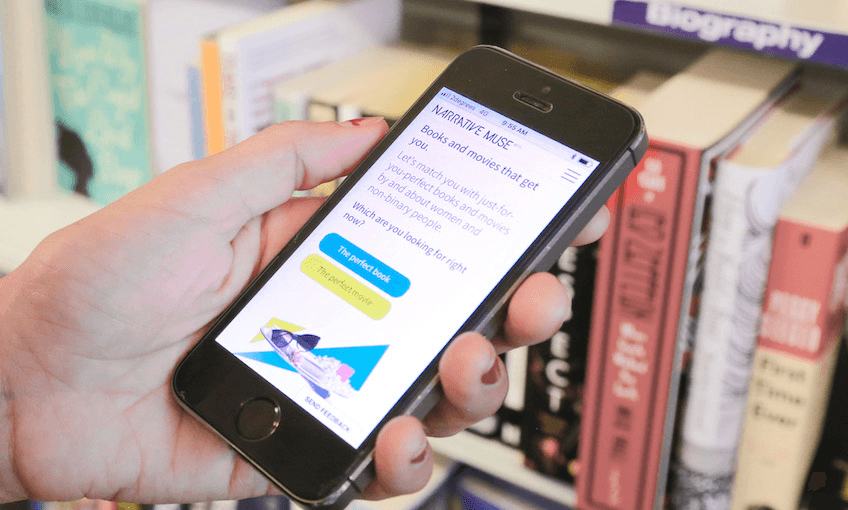Alex Casey talks to Brough Johnson, co-founder of Narrative Muse, about a NZ-made platform that puts the spotlight on women and non-binary creators.
If you don’t think representation in popular culture matters, you should really familiarise yourself with The Scully Effect. The study, conducted across 2000 women in America, revealed that nearly two thirds of women who work in STEM say that Dana Scully from The X Files served as a role model for them in the 90s. Crucially, it also revealed that women who regularly watched The X Files were 50% more likely to work in STEM than women who didn’t watch The X Files. Like the now-infamous mantra by Maria Edelman says – you can’t be what you can’t see.
It’s those positive outcomes of representation that led to recommendation site Narrative Muse being made, says co-founder Brough Johnson. Working in the New Zealand film and television industry as an editor, she found herself unsatisfied with the work she was involved in. She sought answers in Canada, where the pool of work was much larger, and stumbled upon many of the same frustrations. “It became really clear to me that the problem wasn’t in New Zealand, the problem was worldwide – there wasn’t any content that represents me, for me to work on.”
Johnson returned to New Zealand, determined to do something about the representation problem. Joining forces with screenwriter Teresa Bass, they created a site reviewing content that is by and about women and non-binary people. But as soon as they launched, Johnson says they knew they had missed something. “It was a cool thing, but it wasn’t really solving anything.” Going back to the drawing board, the central issue crystalised. “We realised we are all swimming in a sea of content, and we have no idea where to go to find the next cool thing.”
That’s how they came up with the Narrative Muse matchmaker, an online tool to discover your next favourite book or movie made by women and non-binary folk. Drawing from a diverse team of impassioned watchers and readers around the world – all with a broad range of tastes and identity backgrounds – Narrative Muse caters to your specific appetite based on a short introductory survey. “Amazon and the rest tend to just follow your clicks and recommend the same thing back to you, so our goal was to recommend something you wouldn’t usually find.”
The platform required a lot of testing – much of it done by Johnson, CEO, herself. “I spoke to people and asked them all these leading questions to find out what they consider when they are picking stuff to watch or read. By the end of that, it became really clear what the most important questions are.” That, along with researching the habits of 700 people, culminated in the 10 minute taste survey about your ‘no-go zones’ in movies and books (sick of sexual assaults?), as well as genre, tone (feeling the feels?) and your own habits (slow poke or a binger?).
Then voila: a bespoke laundry list of films and books for your precise taste made by and about women and non-binary folk, along with the option to click through and pay for them.
“On the surface it helps audiences find new stuff, but it also genuinely means that audiences are able to make an immediate difference,” says Johnson. “If you spend any money at all on new content, you are voting with your dollar.” Because economics matter a great deal in an industry ruled by the box office – only 4% of the 100 top grossing films in history have been made by women. “It’s not that the content isn’t being made,” says Johnson, “it’s that it’s being made with little financial support, and then it doesn’t get the marketing spend so audiences can’t find it.”
In the world of publishing, the statistics also reveal an uneven playing field. “Women read two thirds of all books but write about 44% of them,” says Johnson. “They are really well represented in classic contemporary literature and romance, and then nothing in realms like non-fiction. It’s not because women aren’t interested in non-fiction, it’s because they’re not seen as experts. And since they’re not experts, they couldn’t possibly know anything interesting.” Other genres, such as sci-fi and horror, don’t fare too well either.
Then there’s television, of course, but the multitude of streaming platforms with geographic restrictions mean that Narrative Muse can’t quite pick your next binge-watch quite yet. “One day we’ll get there,” says Johnson, “but we’re little and it’s still complicated.” What they can confidently work towards is gathering a compelling case for championing alternative voices in film and publishing. “Studios and publishers need to see and grasp the size and scope of the audiences who want this content and back those makers who are providing that representation.”
As tempting as it might be to seek out the content for free elsewhere, Johnson wants audiences to know that their money still speaks volumes. “There’s a belief out there that the man is just taking all our money, but the reality is that the man just doesn’t historically back these people. So if we want to convince anyone that this stuff is worth making, and that there is an appetite for it, we have to pay for it.” She gestures to my coffee. “It’s a small price to pay to make a huge difference in the lives of these creators – just pay $4 for the thing.”

